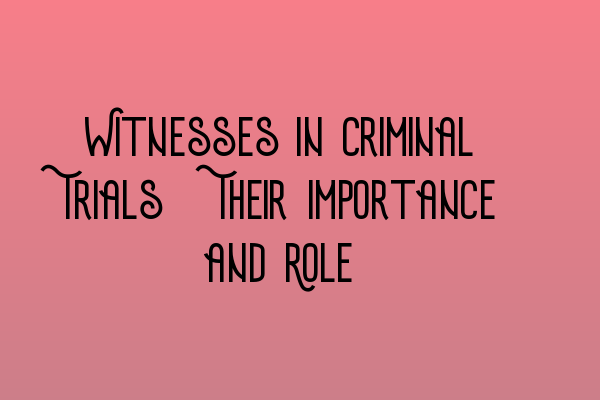Witnesses in Criminal Trials: Their Importance and Role
In any criminal trial, witnesses play a critical role in the pursuit of justice. They provide firsthand accounts and evidence that can be instrumental in determining the guilt or innocence of the accused. Understanding the importance and role of witnesses is vital for both solicitors and aspiring solicitors preparing for the SQE exam.
The Importance of Witnesses
Witnesses serve as the eyes and ears of the court. Their testimonies can shed light on crucial details and events, helping the judge and jury form an accurate and unbiased understanding of the case. Their involvement is essential in establishing the facts and presenting evidence to support the prosecution or defense.
Witnesses provide credibility and validation to the case. Their presence in the courtroom reassures the court and the public that the legal process is fair and transparent. Their testimonies can sway the decision-making process and heavily influence the outcome of a trial.
Moreover, witnesses can bring new perspectives and insights to a case. Their testimonies may introduce previously unknown evidence or provide alternative explanations for the events in question. This additional information can be crucial in uncovering the truth and ensuring a fair trial.
The Role of Witnesses
Witnesses have several responsibilities and duties within the criminal justice system. These include:
- Providing Testimony: Witnesses are required to truthfully and accurately recount their observations and experiences related to the case. Their testimonies are presented under oath or affirmation and can be cross-examined by opposing counsel.
- Identifying the Accused: Witnesses may be required to identify the accused individual, either in court or through other means such as lineups or photo arrays. Their ability to positively identify the accused is crucial in establishing guilt.
- Presenting Evidence: Witnesses may present physical evidence, such as documents, photographs, or objects, that support or clarify their testimonies. These pieces of evidence can significantly impact the outcome of a trial.
- Assisting Investigations: Witnesses can assist in investigations by providing information to the police or other authorities. Their cooperation can help uncover additional evidence or identify other potential witnesses.
Preparing Witnesses for Trial
To ensure witnesses are able to fulfill their role effectively, solicitors must carefully prepare them for the trial. This includes:
- Gathering Information: Solicitors must gather all relevant information from witnesses, ensuring they have a comprehensive understanding of the case. This includes conducting thorough interviews to ensure no crucial details are missed.
- Providing Support and Reassurance: Witnesses can feel anxious or intimidated by the legal process. Solicitors must provide support and reassurance, allowing witnesses to feel comfortable and confident when giving their testimonies.
- Explaining Court Procedures: Solicitors must explain the court procedures and the role witnesses will play during the trial. This includes informing them about potential cross-examination and preparing them for challenging questions.
- Mock Examinations: Solicitors may conduct mock examinations to help witnesses understand the type of questions they may face and how to answer them clearly and confidently. This practice can boost witnesses’ confidence and improve their performance during the trial.
It is crucial for solicitors to prioritize witness preparation to ensure the delivery of accurate and reliable testimonies that contribute to a fair and just trial.
